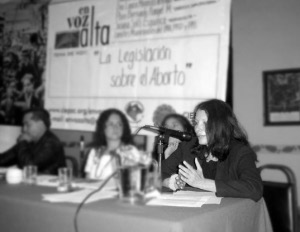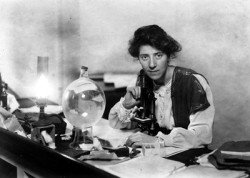Marie Stopes on Health Politics in Mexico
WIA spoke with Dr. Laura Miranda, director of Marie Stopes Mexico about the continuing struggle of the reproductive and sexual health terrain which Mexican women’s groups, other social movements, communities, women and she herself have to face head on. She shares the challenge of sustaining the gains of the recent legalisation of abortion in the country.
Women’s Health in Mexico
 Women in Action (WIA): Can you briefly describe the situation of women’s health, specifically reproductive health and rights in Mexico, among poor and marginalised groups.
Women in Action (WIA): Can you briefly describe the situation of women’s health, specifically reproductive health and rights in Mexico, among poor and marginalised groups.
Laura Miranda (LM): The reproductive health of poor women in Mexico has been affected by the impact of the national economic crisis on public health services. The health system does not have the capacity to attend to the growing population who can no longer afford private services.
The cultural aspect is also a barrier to the indigenous population’s access to services. It is in ancestral domains and their surrounding areas where most maternal deaths happen.
The costs of public health services pose a problem to the majority of poor women.
The recently established popular insurance is not working for them as the rates of maternal death and cervix-uterine cancer are still high.
The situation is even worse in the indigenous communities as different factors contribute to the deterioration of women’s health: malnutrition, low level of education, early marriage and teenage pregnancy, gender violence, and lack of access to health services. These have led to high risk maternity and female deaths due to other causes. Life expectancy of women from these communities is among the lowest in the country.
The cultural aspect is also a barrier to the indigenous population’s access to services. It is in ancestral domains and their surrounding areas where most maternal deaths happen.
Generally, there is ignorance, a lack of awareness on sexual and reproductive rights, and constant violation of women’s rights.
WIA: What would you consider the urgent health needs of women?
LM: Quality health services with the necessary resources and sensitive staff who are trained to attend adequately to the communities. The marginalised conditions of a large number of women from the rural as well as urban sectors, including the indigenous peoples, limit access to services. Among indigenous communities, discrimination is still experienced, and ser vices remain inaccesible, if not unavailable.
Health education and awareness of sexual and reproductive rights are important factors in creating a conscience among the population, and allowing them to claim the fulfillment of their rights.
The government programmes often include include in theory sensitive elements such as sexual and reproductive rights, but these are not implemented. There are also operational difficulties such as the bureaucracy, and lack of resources, as well as the need for trained and sensitive staff.
Marie Stopes
15 October 1880 – 2 October 1958
Marie Stopes is among the pioneers of family planning. Influenced by her mother, Stopes joined women’s movements which then centred on the suffrage rights. During the early years of her first marriage, she published a sex manual, Married Love, which asserted the equal responsibilities of couples. Although this became a bestseller, several publishers previously rejected the manuscript, which only saw print after the First World War. Married Love was immediately followed by the publication of Wise Parenthood in 1918.
A botanist and eugenicist by training, Stopes collaborated with Margaret Sanger, a nurse-activist who was campaigning for birth control. In the 1920s, she edited the journal Birth Control News which appalled the Church of England and the Vatican. By 1921, She opened a mother’s clinic in London.
Such clinic has been replicated and modernised in different parts of the world in the last 32 years, under the name of Marie Stopes International. In 2007, MSI extended its services to more than 5,000,000 women and men, protecting them from unwanted pregnancy and unsafe abortion.
MSI also expanded its coverage as it opened new programmes in Ghana, Mexico City, Papua New Guinea and Timor Leste, increasing its global clinic network from 431 to 464. MSI is expecting to establish six new country programmes in Africa this year.
Source: Marie Stopes International; “Marie Stopes.” Retrieved from Spartacus Educational on 19 April 2008 http://www.spartacus.schoolnet.co.uk/Wstopes.htm
WIA: What has been the response of churches and religious organisations on the health needs of women?
LM: The Catholic Church does not respond to the reality lived by Latina women when it comes to sexual and reproductive health.
Recently, the Church conducted a strong campaign against abortion without taking into account the problems women face with an unwanted pregnancy. The campaign also did not propose any alternatives to the social problem of abandoned and abused children.
Public opinion polls show that religion should not intervene with such political decisions, rather leave it to the women to make their own decisions.
The media, on the other hand, very seldom takes up the issue of women’s health rights.
WIA: How would you describe the situation of (induced) abortion.
LM: There is no exact information about the number of induced abortions in the country. There are big discrepancies between the different figures which have been published. According to official estimates, the number of induced abortions have gone down, from 220,000 annually between 1990-1992 to 196,000 annually between 1995-1997. Other sources estimate up to 800,000 abortions annually.
Induced abortion is commonly practised in Mexico. Despite its criminalisation, a high percentage of women have had an abortion, thereby, putting their physical and emotional integrity at risk.
The percentage of women who declare that they have had at least one abortion has decreased, from 19.6 per cent of women between 15 – 49 years of age who got pregnant at least once in 1992 to 19 per cent in 1997 to 13.4 per cent in 2003.
Abortion occurs in all social-economic classes. However, poor women live with it differently. Since access to a safe service is difficult, they often put their lives at risk.
WIA: What are the common reasons among women and couples who consider abortion?
LM: The reasons for abortion are multiple. Although mainly economic, they also include enough number of children, lack of support from the partner or absence of a stable partnership, interr uption of a life project- either professional or studies or others.
Generally, abortion is stigmatised and morally loaded by religion. However, polls reveal that there is a major openness towards the topic, that it is an issue that primarily concerns women. As such, women have to make the decision.
As abortion is penalised in most parts of the country, majority of the women experience it illegally, often alone or with the help of a friend or relative. Seldom do they have the support of their partners.
At the moment, women opt for an abortion with medication. This option has become very popular, especially among those who have access to the information and the drugs. The poorer women do not have this information. They are the ones who opt for harmful techniques that often do not have the desired results, thereby endangering their health.
WIA: How does Mexican society generally view abortion and women who opt for abortions?
LM: Generally, abortion is stigmatised and morally loaded by religion. However, polls reveal that there is a major openness towards the topic, that it is an issue that primarily concerns women. As such, women have to make the decision.
The medical society refuses to be drawn into this problem. The doctors within the institutions call themselves conscientious objectors of delayed legal abortions. Even as abortion is already legal, there remains a very strong stigma against doctors who perform abortion. Therefore, some medical staff refuse to conduct abortions even under legal conditions. But there are also doctors who perform and profit from this service.
But the experience in the hospitals in the Federal District (capital region) was positive. Prior to the legalisation of abortion up to the 12th week, there were hospitals at the district that conducted abortion such as in the case of a pregnancy from rape. However, not all the staff are equally committed to this issue.
Thanks to the work of women’s organisations and other civil society actors, women’s right to abortion became a reality.
The recent experience of the change of law in favour of abortion in the Federal District is an example of society’s support for abortion liberalisation. It also brought to light the weaknesses of the arguments of the conservative groups linked to the present right-wing government. Meanwhile, the groups that campaigned for legalisation of abortion have become stronger and have made major impacts in more conservative environments.
Community Service and Other Strategies
WIA: What are the strategies you employed in reaching remote communities?
LM: Marie Stopes Mexico reaches the remote communities and offers them integrated reproductive health services, including maternal death prevention and the promotion of reproductive health. The strategy has been to respect and take into account the local authorities and the existing health structures in the communities, including the recognition of the work of traditional midwives.
Marie Stopes Mexico also participates in local and regional inter-institutional committees to avoid duplicating existing initiatives and to involve more actors with the same objectives.
Many women in the communities die of hemorrhage while giving birth. They need access to health services. The government has done efforts that have not always had the desired impact.
The intercultural aspect is one of the basic elements in this approach. In a multicultural context such as in Chiapas and other regions in Mexico where “mestiza” populations live together with indigenous people, it is necessary that the health workers are trained to be culturally sensitive such that they recognise that individuals have different perspectives, judgments and values, depending on their cultural background. Both the culture of the provider of health services and that of the patient have an impact on treatment and care.
Marie Stopes-Mexico
WIA: What have been the contribution of Marie Stopes in reproductive rights advocacy in Mexico?
LM: Marie Stopes Mexico has been participating in the committee “Maternity without Risks,” contributing to the consciousness raising activities for government authorities. It has also been participating in events such as fora and capacity building programmes for health workers. We also maintain direct relations with organisations which defend reproductive and sexual rights in Mexico and Latin America. We also have a project that targets teenagers and youth in the Chiapas where we hope to influence public politics in coordination with non- governmental organisations and with the support of Redesde.
The mission of Marie Stopes is “Hijos por Elección, No por Azar” (Children by Choice, not by Chance). Marie Stopes Mexico programmes focus on services on sexual and reproductive health directed towards the population that does not have easy access to those services.
The difficulty lies in coordinating activities with health authorities with whom we occasionally do not share the same strategies.
WIA: What are its current programmes and services?
LM: The mission of Marie Stopes is “Hijos por Elección, No por Azar” (Children by Choice, not by Chance). Marie Stopes Mexico programmes focus on ser vices on sexual and reproductive health directed towards the population that does not have easy access to those services.
We also have a project on the social marketing of contraceptives with the objective of bringing the methods, especially the use of condom, to the most vulnerable population.
Marie Stopes International has programmes in 40 countries where it offers a wide range of sexual and reproductive health services to the poplulation who have less access to these services.
WIA: What are its plans?
LM: We want to continue to bring our programmes to countries with greater poverty and marginalisation so that we reach the population that needs it the most.
Legalisation of Abortion in Mexico
WIA: What would you consider the crucial factors behind the successful legalisation of abortion in Mexico?
LM: The hard and committed work of feminist organisations for many years in favour of sexual and reproductive rights, especially the access to safe abortion to generate equality among women to make their own decision. On the other side, there is the favourable political context with a progressive, left government.
Public opinion was fundamental. The consciousness that the Catholic Church should not intervene in state affairs
became stronger over time, especially when it concerns the legalisation of decisions with impact on women’s bodies.
The campaigns focused on the right to decide for a legal abortion in case of rape. That is where the contradictions and weaknesses of groups such as Pro-Life and the Catholic Church became obvious.
Marie Stopes Mexico was one of the organisations that fought for the right to legal and safe abortion. Actually, Marie Stopes Mexico coordinates efforts to offer accessbible services. With its international experience in creating successful care models, it works with civil society organisations and the government of the Federal District.
Gender violence, inequalities, poverty are part of an environment where thousands of women are confronted with unwanted pregnancies. They experience desperation, need, lack of support, isolation, guilt. Precisely, as a society, as professionals, and as individuals, we should be sensitive to such conditions, and support laws and services that favour the lives of women.
There are many testimonies from women who inspire our work. Abortion is a question of social injustice that exacts high costs from women and society as a whole.
There is a need to create a health politics that corresponds better to the needs of the women.
With Bianca Miglioretto as translator.





 The
The 
 Isis Resource Center holds one of the largest feminist collections of materials in the Global South. With 40 years of publication experience, Isis holds a vast collection.
Isis Resource Center holds one of the largest feminist collections of materials in the Global South. With 40 years of publication experience, Isis holds a vast collection.